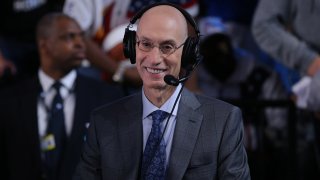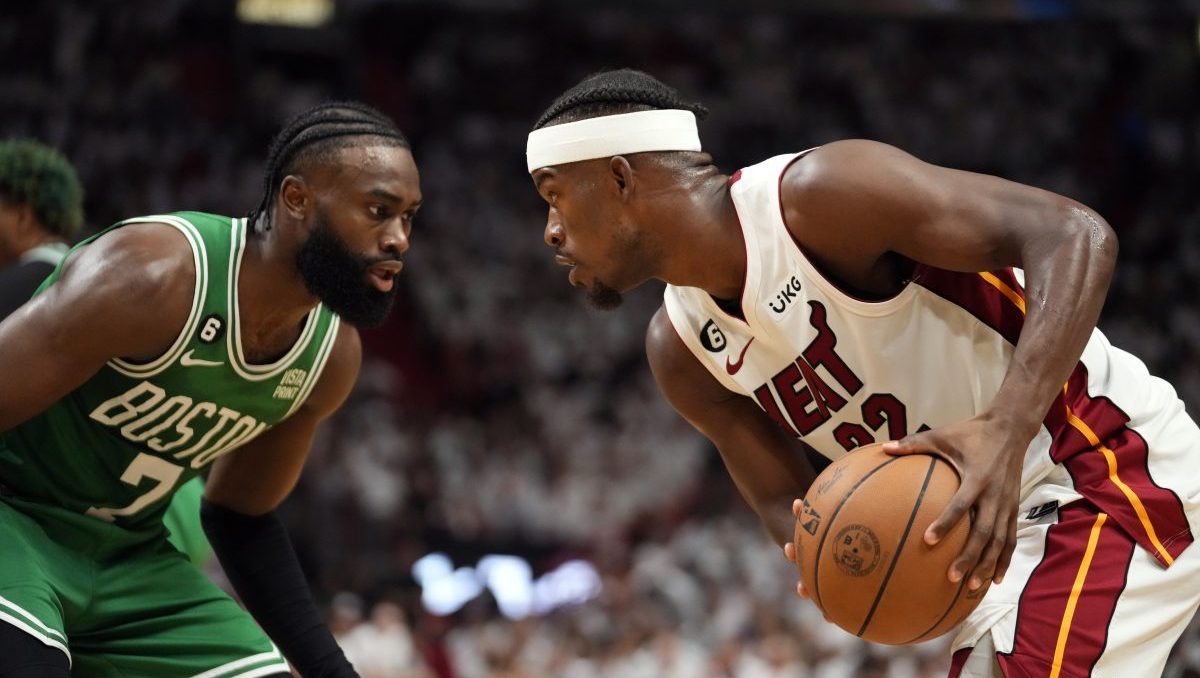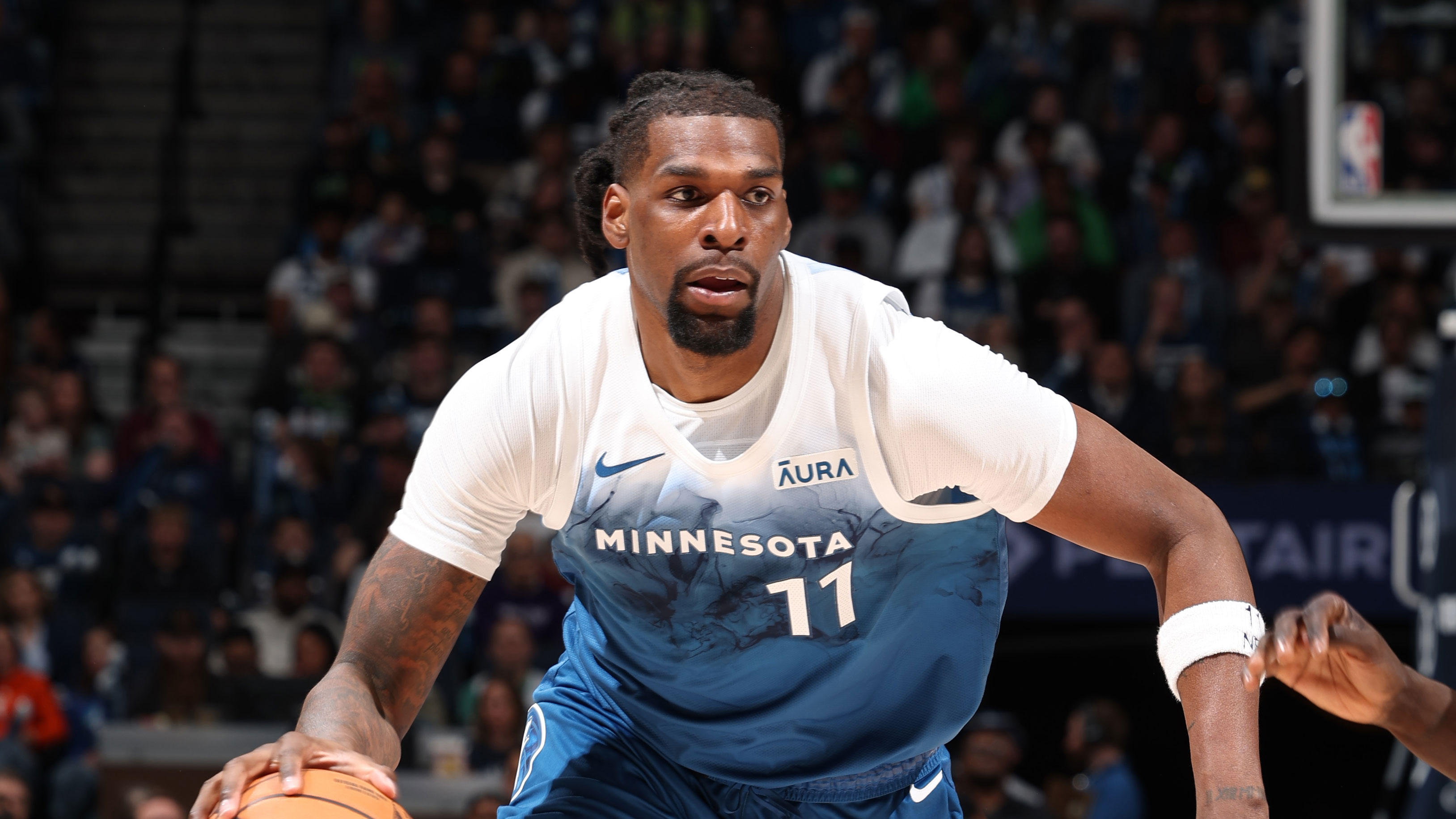
NEW YORK — When the Bulls last hosted the NBA All-Star game in 1988, Adam Silver, then a student at the University of Chicago, attended the festivities at the old Chicago Stadium as a fan.
On Feb. 14, All-Star weekend begins at various venues around the city, culminating with the Feb. 16 All-Star game at the United Center.
“I’m looking forward to better seats,” Silver deadpanned.
Long before he succeeded David Stern as fifth commissioner in NBA history in 2014, Silver was a basketball fan. He grew up in New York as a Knicks fan and cheered for the Blue Devils as an undergraduate at Duke University before arriving in Chicago.
While studying law at the University of Chicago, where he called future Mayor Lori Lightfoot a classmate, Silver and friends used to catch Bulls games at Chicago Stadium and White Sox games at Comiskey Park.
Back then, you could walk up to the ticket window on game day and secure seats to watch a young Michael Jordan in action.
“There was a particular energy around the league at that time,” Silver said of Chicago Stadium, circa 1985-88. "You felt when you were at games that you were on to something that hadn’t gone mainstream. You felt like you were discovering something.”
NBA
Now, the NBA is a global behemoth. Many of its players have achieved one-name recognition status in all corners of the world.
But the league is also hurting emotionally. Stern passed away January 1 at age 77 after suffering a brain hemorrhage in December. And Kobe Bryant died tragically at age 41 on January 26 in a helicopter crash that claimed nine victims, including Bryant’s 13-year-old daughter, Gianna.
Against that backdrop, Silver sat down with NBC Sports Chicago for a 40-minute interview at the NBA’s midtown Manhattan office. Here is Part 1:
NBC Sports Chicago: What have you seen from the NBA community from David’s passing to Kobe’s, which is hard for anybody to wrap their mind around?
Silver: It’s a reminder of how strong this family is. From team owners, former team owners, players, former players, executives at the league and teams and even alumni, it feels like a family organization. During difficult times, a family comes together. I’ve been really moved this week by the outpouring of support for not just Kobe’s family but the families of the other victims of that helicopter crash. I’ve been moved by the players’ desire to memorialize Kobe and his daughter at the All-Star game and the events that are now coming together — and also by those who want to make sure that we recognize David Stern at an otherwise celebratory occasion like All-Star weekend.
I’ve always felt that it was special to be part of this league. And now, in my 28th year here, I’m constantly reminded of that. Even then by fans globally, who by social media or directly to the league office, reach out to share their condolences and their desire to participate in some way in remembering both Kobe and David.
In comments to Chicago reporters, Bulls executive vice president John Paxson talked about the connectivity and community of sport.
I think John is so right. We see firsthand what a unique role sports play in our society and globally. Particularly in China, where the NBA enjoys tremendous popularity, and where both David Stern and Kobe were revered. Even despite tensions between our countries and a few bumps in the road with the league in China, these losses have brought us closer. I’ve talked to many of my friends in China about this.
The connectivity that comes through sports is unlike anything else we’re familiar with. These are special bonds. It’s been particularly moving for me. As important as David Stern has been in my life, and as renowned as Kobe was as a player and more recently as a filmmaker and businessman, the outpouring of support is beyond what I ever would’ve understood or anticipated because it’s so global and so far-reaching.
You cited the celebratory nature of All-Star weekend. How do you as commissioner and as a league try to strike the proper balance between that while also honoring the legacies of Stern and Bryant?
By remaining authentic and not trying to force anything. By putting in place the platform both for memorializing but also celebrating and letting these events play out in their own way. That’s what I’ve learned over many years here. You don’t want to try to overproduce these events. I have no doubt that there will be spontaneous moments. I think some things we are planning may fall flat or not have the desired impact. But other small moments that we would’ve never anticipated would have the consequences they do will invariably end up being the most memorable moments of the weekend.
The same advice I hear from experts in terms of grieving is that you must allow these emotions to unfold in a natural way. Don’t force things. I think all of us in our own lives through moments of grief — loss of family members and others — often you’re seemingly OK in one moment and you feel devastated in another. You just let it play out and accept that’s the state you’re in at that moment. And I think we’ve seen this over the last few days of games. There have been players who didn’t feel up to playing but then found some special inspiration once they got on the floor. And I think there are other younger players who never knew Kobe but have been affected in ways they would’ve never been able to predict.
Your league tweaked the All-Star game format. What was the genesis behind that and how eager are you to see how it plays out?
The genesis of this latest tweak comes directly from Chris Paul, who called me last summer and said, ‘I’m a big fan of The Basketball Tournament. And are you familiar with the so-called Elam endings?’ And I said I was. I’ve watched it a few times. I said, ‘It’s fascinating to me.’ I think in some cases it’s confusing to some fans. But Chris said, ‘I think it’s terrific. I think we should look at changing the format.’ I said, ‘If that’s something you’re serious about, why don’t you talk to other members of your executive committee — he’s the president of the players association — and other players whose views you respect and I’ll talk to my colleagues at the league office and members of our competition committee. And what we heard back from everyone was it sounds really intriguing. Let’s try something new.
(Editor’s note: The Basketball Tournament is an open invitation tournament with $2 million prize money that, back in 2017, adopted an ending strategy created by university professor Nick Elam in which a target score is established to discourage late-game fouling.)
We combined a few different concepts here. Our so-called Elam ending is different than the traditional Elam ending where you get to a certain point at the end of the game and you have eight points. We had still been exploring different concepts. But as we were looking at ways to commemorate Kobe, this notion of adding 24 points in the fourth quarter was suggested by a few people. That seemed fitting. Sort of independent of the Elam concept was making each quarter in its own right a competition and creating a charitable association with the outcome for each quarter. For us, it felt like something new to try.
I’ve learned the hard way in my many years here that people generally don’t like change. I mean, everyone talks a good game about innovation. But then when you try it, there are plenty of critics out there. But at the end of the day, I feel you have to be extraordinarily cautious about affecting our regular season or playoffs. But when it comes to an All-Star game, it is a celebratory occasion. I hear from those who say, ‘I remember back in the day, players competed in a different fashion in All-Star.’ But like a lot of things in life, they change. We have a partnership with our players and this is something they think they’ll have fun in. I recognize you want to have a competitive game. But this is not the place necessarily you want players to go all out and risk potential injury. I think this is something new and intriguing for fans.
You also announced plans for Team LeBron (James) to wear No. 2 and Team Giannis (Antetokounmpo) to wear No. 24 to honor Gianna and Kobe Bryant’s numbers, as well as jersey patches with nine stars to honor all victims. Some had suggested having one team wear Kobe’s No. 8 and the other wear Kobe’s No. 24. But this gesture had to touch all families involved, as well as current players?
It’s celebratory but emotional. This is what makes these great athletes such special people too. I think what we forget sometimes as fans is that this is a very public mourning period. But at any given time, in a league of 450 players, dozens of coaches, hundreds of league executives, somebody is invariably going through some sort of personal tragedy — most often not known to the public. Yet our players and teams continue to compete. It’s in some ways why these athletes are so inspirational to people. And Kobe in particular because Kobe was all about competition, maybe more than any player I’ve known in the league. Not to take anything away from the greatest players ever, but his off-the-floor work ethic was beyond belief to other players in some cases.
I remember when we were in Beijing for the 2008 Olympics. We’d be having breakfast in the meal room with the players as part of USA Basketball. And Kobe would’ve already completed his morning workout. I think it was eye-opening for a lot of the other players, including the young All-Stars who were there. I think the younger players learned from Kobe that to the last day he played in the league, he always felt there was a new aspect to his game that he could improve on. He took that competitive passion into business when he retired. We knew each other well when he was a player. But at the tail end of his career and his post-career, we probably had the most intense discussions about filmmaking. I was the president of NBA Entertainment earlier in my career, so I have a production background. The fact that he won an Academy Award, talk about things you could’ve never anticipated.
He embraced the entertainment community. We had him speak to our team executives and marketing partners at a forum about his love of storytelling and business. He spoke at our technology summit in Los Angeles a few years ago. I remember just personally always coming away inspired after hearing him speak. And I know that’s the way he connected with a lot of people. He made you want to work harder. The passion he would bring to the most minute details, I think all of us would sort of transfer that notion to whatever we were doing in our own lives. And I think that’s why his loss has had the kind of impact it has globally.
Coming Tuesday: Part 2 of the interview, with Silver detailing his Chicago sports experiences and the NBA’s relationship with Jerry and Michael Reinsdorf and the city of Chicago.
Click here to download the new MyTeams App by NBC Sports! Receive comprehensive coverage of your teams and stream the Bulls easily on your device.


